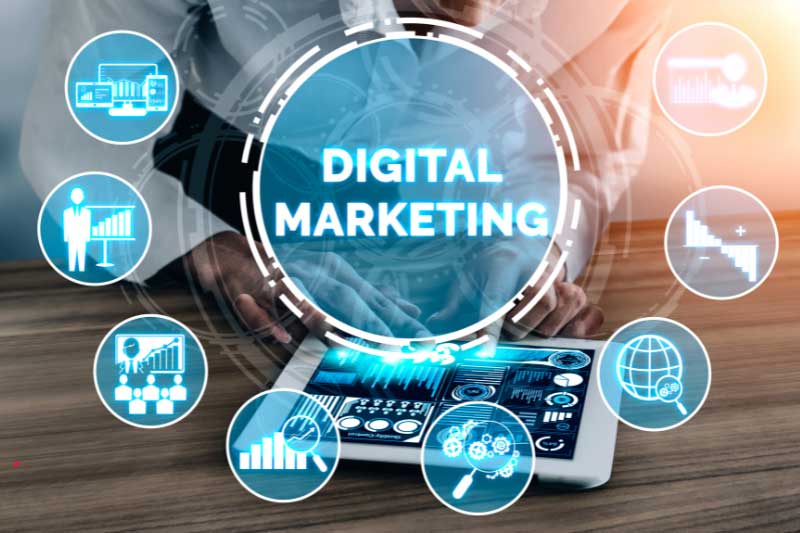In a world where nearly everything is digital, understanding digital marketing is crucial for businesses striving for success. Mastering digital marketing can feel like navigating a vast maze for business owners and marketers. With its constant evolution and diverse strategies, it’s essential to grasp what digital marketing entails and why it’s a pivotal component of modern business success.
This blog post aims to demystify digital marketing, explore its significance, and offer practical insights to enhance your marketing efforts. Whether you’re a seasoned marketer seeking to refresh your knowledge or a beginner looking to understand the basics, this comprehensive guide will illuminate the path toward successful digital marketing strategies.
Understanding Digital Marketing
Digital marketing encompasses a range of online strategies used to promote products or services. From search engines and social media to email and mobile apps, digital marketing leverages various channels to reach and engage target audiences. By utilizing these platforms, businesses can connect with potential customers who spend a significant portion of their time—online.
Digital marketing is not confined to a single tactic but comprises a collection of strategies tailored to different goals and audiences. It involves optimizing websites for search engines, creating engaging content, running targeted advertising campaigns, and analyzing data to refine approaches. This multifaceted nature makes it a powerful tool for reaching audiences efficiently.
The beauty of digital marketing lies in its adaptability and measurability. Unlike traditional marketing methods, digital marketing allows for real-time tracking and optimization. Businesses can gather insights into customer behavior, preferences, and interactions, enabling them to tailor their strategies for maximum impact and return on investment.
Key Elements of Digital Marketing
Digital marketing is a tapestry woven with various elements working together to achieve business goals. These key components include search engine optimization (SEO), content marketing, social media marketing, email marketing, pay-per-click (PPC) advertising, and analytics. Each element is distinct in driving brand awareness, engagement, and conversions.
SEO is the foundation of digital marketing, ensuring that a business’s online presence is discoverable by search engines. By optimizing website content and structure, companies can improve their visibility in search results, driving organic traffic and increasing the likelihood of attracting potential customers.
Content marketing involves creating valuable and relevant content to attract and engage audiences. Through blog posts, videos, infographics, and more, businesses can establish themselves as industry authorities while providing solutions to customer pain points. This approach not only educates but also builds trust and credibility with audiences.
Social media marketing leverages platforms like Facebook, Instagram, Twitter, and LinkedIn to connect with audiences personally. By sharing engaging content, interacting with followers, and running targeted advertising campaigns, businesses can foster relationships and drive engagement, expanding their reach and influence.
The Rise of Mobile Marketing
With the proliferation of smartphones, mobile marketing has become an integral part of digital marketing strategies. Mobile devices offer direct communication with consumers, allowing businesses to engage with them anytime, anywhere. From mobile-friendly websites to app-based marketing, mobile strategies are essential for reaching today’s tech-savvy consumers.
Mobile marketing involves optimizing websites for mobile devices, ensuring seamless user experiences across screens of all sizes. Additionally, businesses can leverage mobile apps to engage users and offer personalized experiences. Push notifications, location-based offers, and mobile-exclusive content are powerful tools for capturing user attention and driving engagement.
The rise of mobile marketing emphasizes the importance of responsive design and user-centric experiences. With more people accessing the internet through mobile devices, businesses must prioritize mobile optimization to remain competitive. Failing to cater to mobile users can result in missed opportunities and decreased brand credibility.
The Rise of Mobile Marketing
Social media is a dynamic landscape that offers unparalleled opportunities for businesses to connect with audiences. Platforms like Facebook, Instagram, Twitter, and LinkedIn provide interaction, engagement, and brand storytelling avenues. By harnessing the power of social media, businesses can humanize their brand and cultivate meaningful relationships with customers.
Social media marketing involves more than just posting content—it’s about fostering a sense of community and belonging. Engaging with followers through comments, likes, and shares builds a loyal audience that advocates for the brand. Additionally, businesses can run targeted advertising campaigns to reach specific demographics, driving traffic and conversions.
The real-time nature of social media allows businesses to stay relevant and responsive. Trends evolve rapidly, and companies that can adapt quickly stand out. Social media listening and monitoring provide insights into customer preferences, enabling businesses to tailor their content and strategies to meet changing demands.
Email Marketing's Enduring Impact
In the digital age, email marketing remains a powerful tool for nurturing customer relationships and driving engagement. With its directness and personalization capabilities, email marketing enables businesses to deliver targeted messages that resonate with their audiences. Whether it’s promoting products, sharing updates, or offering exclusive deals, email marketing remains a staple in digital marketing strategies.
Email marketing allows businesses to communicate directly with their subscribers, who have opted in to receive content. This creates a captive audience that is more likely to engage with the brand’s messages. Personalization is key, with tailored content delivering higher open and click-through rates.
Segmentation and automation are crucial aspects of successful email marketing campaigns. Businesses can send relevant content that resonates with each group by dividing subscribers into segments based on demographics, behavior, or preferences. Automation streamlines the process, ensuring timely message delivery and freeing up resources for other initiatives.
Pay-Per-Click Advertising Explained
Pay-per-click (PPC) advertising is a targeted approach to reaching potential customers through online ads. Businesses bid on keywords related to their products or services, and they pay for each click their ad receives. This model ensures that companies only pay when their ad generates interest, making it a cost-effective way to drive traffic.
PPC advertising offers precise targeting options, allowing businesses to reach specific demographics, locations, and interests. Platforms like Google Ads and Facebook Ads provide robust tools for creating and managing campaigns, optimizing performance, and maximizing return on investment. This level of control enables businesses to refine their strategies for optimal results.
The success of PPC campaigns relies on data analysis and continuous optimization. Businesses can track click-through rates, conversion rates, and cost-per-click metrics to evaluate campaign performance. By analyzing these insights, companies can make informed decisions to improve their ad strategies and achieve desired outcomes.
The Role of Content Marketing
Content marketing involves creating valuable, informative, and engaging content that resonates with target audiences. By addressing customer pain points, answering questions, and providing solutions, businesses can establish themselves as industry thought leaders and trusted authorities. Effective content marketing builds brand credibility and fosters long-term relationships with audiences.
Creating compelling content involves understanding the needs and preferences of the target audience. Blogs, videos, infographics, and podcasts are just a few formats businesses can use to convey their message. High-quality content is shareable and encourages organic engagement, extending the brand’s reach and influence.
Content marketing is an ongoing process that requires consistency and creativity. Businesses should regularly update their content to stay relevant and provide fresh insights. A well-executed content strategy can drive organic traffic, enhance SEO efforts, and nurture leads through the buyer’s journey.
Search Engine Optimization Unveiled
Search engine optimization (SEO) enhances a website’s visibility on search engines like Google. Businesses can improve their search engine rankings and attract organic traffic by optimizing website content, structure, and technical elements. SEO is fundamental to digital marketing, ensuring potential customers can easily find a business online.
Effective SEO involves a combination of on-page and off-page strategies. On-page SEO optimizes individual web pages with relevant keywords, meta tags, and quality content. Off-page SEO involves building high-quality backlinks and establishing a strong online presence through social media and guest posting.
SEO is an ongoing effort that requires monitoring and adaptation. Search engine algorithms evolve; businesses must stay updated with best practices to maintain rankings. By investing in SEO, companies can increase their online visibility, drive targeted traffic, and outperform competitors in search results.
Analytics for Informed Decision-Making
Analytics is the backbone of digital marketing, providing valuable insights into campaign performance and customer behavior. Businesses can make informed decisions, refine strategies, and allocate resources effectively by analyzing data. Analytics tools like Google Analytics, HubSpot, and Adobe Analytics offer comprehensive data tracking and reporting capabilities.
Data analysis enables businesses to understand what works and what doesn’t in their digital marketing efforts. Metrics such as website traffic, conversion, bounce, and engagement levels provide a holistic view of marketing performance. These insights empower businesses to optimize their strategies for maximum impact.
Continuous monitoring and analysis are essential for staying competitive. Businesses can identify trends, uncover opportunities, and address challenges promptly by leveraging data-driven insights. By leveraging these insights, businesses can make strategic decisions that drive growth and enhance customer experiences.
Building a Strong Online Presence
A strong online presence is vital for businesses succeeding in the digital landscape. It involves creating a cohesive brand identity across various online platforms, including websites, social media, and online directories. A consistent and engaging online presence builds brand recognition, credibility, and audience trust.
A strong online presence begins with a user-friendly website reflecting the brand’s values and offerings. Social media platforms serve as extensions of the brand, allowing businesses to connect with audiences on a personal level. Consistency in branding, messaging, and visuals reinforces the brand’s identity and fosters brand loyalty.
Engagement is a key factor in building an online presence. Businesses should actively interact with their audiences through comments, messages, and social media engagement. By responding promptly and authentically, companies can create meaningful connections and demonstrate their commitment to customer satisfaction.
Digital Marketing Success Stories
Real-world success stories highlight the tangible impact of digital marketing on businesses of all sizes. Businesses, from startups to established enterprises, have leveraged digital marketing strategies to achieve remarkable results. These success stories serve as inspiration and provide valuable insights for businesses looking to enhance their own marketing efforts.
One notable success story involves a small boutique that used targeted social media advertising to increase foot traffic and online sales. By running localized ads and engaging with customers through interactive content, the boutique saw a significant boost in brand visibility and revenue.
Another success story features an e-commerce brand that used SEO and content marketing to establish itself as a thought leader in its industry. By consistently publishing informative and relevant blog posts, the brand attracted a loyal following and experienced substantial organic traffic and sales growth.
Digital Marketing's Future Trends
The digital marketing landscape constantly evolves, with new trends and technologies shaping its future. Artificial intelligence, voice search, augmented reality, and personalized experiences are emerging trends that will continue influencing digital marketing strategies. Staying informed about these trends is crucial for businesses aiming to remain competitive.
Artificial intelligence is revolutionizing digital marketing by enabling personalized experiences and predictive analytics. AI-powered chatbots, recommendation engines, and data-driven insights enhance customer interactions and optimize marketing efforts. Businesses that harness AI’s capabilities can create more relevant and engaging experiences for their audiences.
Voice search is transforming the way consumers interact with search engines and devices. Optimizing content for voice search is becoming increasingly important for businesses looking to capture voice-based queries. Conversational keywords and natural language optimization are key strategies for succeeding in the voice search landscape.
Conclusion
In the digital age, understanding and implementing effective digital marketing strategies is essential for businesses of all sizes. From improving brand visibility to driving engagement and conversions, digital marketing offers many opportunities for growth and success. Businesses can thrive in an interconnected world by staying informed about the latest trends and leveraging the power of digital marketing.
The dynamic nature of digital marketing requires continuous learning and adaptation. Businesses can position themselves for success by investing in education, staying informed about industry developments, and collaborating with experts. Whether you’re a business owner, marketer, or entrepreneur, digital marketing is a powerful tool that can transform your business and drive meaningful results.
Explore further resources, connect with industry experts, and take actionable steps to enhance your digital marketing efforts. The digital marketing landscape is a vast and exciting world waiting to be explored. Are you ready to make your mark?







